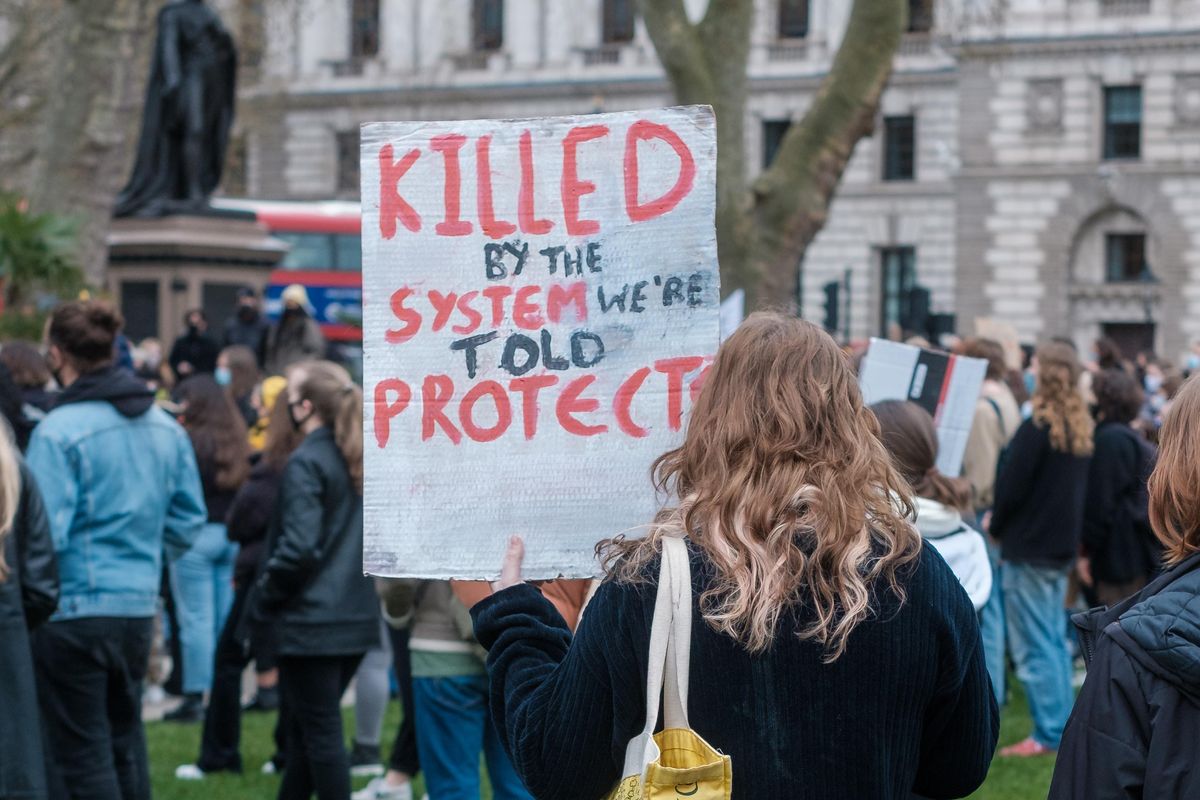After Sarah Everard and Sabina Nessa, is it time to make misogyny a hate crime?
Would making misogyny a hate crime stop violence against women in the UK?

It's been six months since 33-year-old Sarah Everard disappeared on her walk home.
Recently, Wayne Couzens, a serving police officer with the Metropolitan Police, was found guilty of her kidnap, rape and murder and sentenced to a whole life order, meaning he will never be released and will die in prison.
Sarah Everard's murder at the hands of someone who was supposed to protect her has been something I've been unable to stop thinking about. Walking her route home at 9:30PM, in bright clothes, by taking main roads and having just called her boyfriend, Sarah Everard did everything she was "meant to do" – All she was trying to do was get home safely, before she was abducted in the street under the guise of a 'false arrest'.
Sarah Everard represents that women's fears over their safety have always been legitimate and valid. We can do everything we are supposed to do and still get murdered, because the problem isn't us.
Wayne Couzens is not just "someone who slipped through the system", he knew exactly what he was doing. Three days before the murder, he was caught on CCTV flashing a drive-thru McDonalds worker. Adding to this, recent reports have also extensively detailed how Couzens was nicknamed "The Rapist" by colleagues because he made female colleagues so uncomfortable. Why did this behaviour remain unchecked? In any other scenario or establishment, if someone was nicknamed "the rapist" they'd be immediately investigated, sacked and challenged. Instead, a woman who had her whole life ahead of her, is dead.
Last week, it also emerged that no less than twenty-six of his colleagues have committed sex crimes in the past 5 years. As I write this, another serving Metropolitan Police officer has just been charged with rape, a reminder that predatory men walk amongst us, some hidden in plain sight, others masquerading as our protectors. Wayne Couzens is not "one bad apple" as people would like to think, he is the product of a rotten system that needs restructuring.
Violence against women isn't limited to this incident, it's systemic. According to Femicide Census, a woman is murdered by a man every three days across the UK.
Sabina Nessa, was a 28-year-old woman who was taking a short walk to meet friends when she was murdered in what is thought to be a 'random' attack. A 36-year-old man has since been charged with her murder. Sabina's murder is something I also struggled to absorb. As a fellow South Asian woman, was it because her graduation picture looks just like mine, hanging on the living room wall? Is it because we know as minority women, we stand a chance of not making the main headlines if we were killed? Is it because she was taking a short, five-minute-walk on a route that was familiar to her? It's because the reality is, Sabina Nessa could have been any one of us.
There are arguments for misogyny to be recognised as a hate crime in the UK. On the outset, this would be seen as a step in the right direction and would ensure the courts treat it more seriously, but extending the powers of the police really isn't the solution here. Ultimately, making misogyny a hate crime will not stop male violence against women when it's also institutional. Giving more power to an institution that arguably has a problem with misogyny and sexism isn't the answer, not unless this system is reformed first and there is a robust, criminal justice system in place, instead of one that is barely fit for purpose.
September was a heavy month for women in the UK. We are reminded that no matter what we do and no matter how many precautions we take, it still might not be enough.
We send our locations to our friends whenever we go anywhere new or go on a date.
We tell our friends "text me when you get home" and stay awake until we hear from them.
We learn self-defence and hold our keys in our fists when we walk alone.
We purposely take the main roads which are well lit and have street-lamps.
We take our headphones out to hear footsteps that are getting too close.
We lock our doors when we drive our cars alone.
We watch our drinks and never leave them unattended.
We try our best not to go out at night, unless we have to.
Every woman you know has tried their best, knowing that it still might not be enough.
For every woman you know, keeping safe is a continuous burden. The list is endless and exhausting. The problem is not our actions, it's not what we wear, how we act or what we do. It's not what we do or don't do to "keep safe'" the problem is solely male violence and until we treat this as the epidemic it is and challenge misogyny in all its forms, we will keep seeing another name in the headlines.
Yes, we know that it's "not all men" - but it's still too many. Until we have widespread education on what produces and upholds misogyny and toxic masculinity, we won't see any real change.
Sarah Everard did everything 'right', she was just walking home. Sabina Nessa did everything 'right', she was just walking to see a friend.
Women should be able to walk anywhere they want, without the fear of being murdered - without the fear that they might not make it home.


